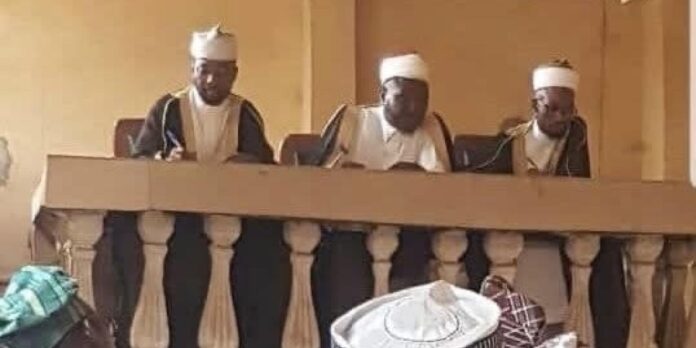The Chief Imam of Lekki Central Mosque, Sheikh Ridwan Jamiu, has ignited a wave of support among Muslims in the South-West, urging them to reject any governorship candidate who fails to commit to the establishment of Sharia courts in the region.
Speaking to a congregation during the Friday Juma’at sermon at Lekki Central Mosque, Sheikh Jamiu made it clear that the upcoming elections in South-Western Nigeria should be a referendum on the commitment of political candidates to Islamic law.
“As Muslims, we must hold politicians accountable,” Sheikh Jamiu declared passionately. “The time has come for us to demand that any governorship candidate seeking your vote must commit to establishing Shariah courts in our state.”
He stressed that the absence of Sharia courts in the South-West was a violation of the constitutional rights of Muslims, particularly in a region with a large and growing Muslim population. Sheikh Jamiu’s call comes at a time when South-West governors are preparing for the upcoming elections, with political campaigns in full swing.
The Imam’s comments resonated deeply with his audience, many of whom believe that Sharia courts are crucial for resolving personal, civil, and family matters within the Muslim community. He cited Nigeria’s constitution to justify the demand, referencing sections 38 and 40, which guarantee freedom of religion and association for all citizens, regardless of their religious affiliation.
A Long-Standing Demand for Shariah Courts in the South-West
The demand for Sharia courts in the South-West has been a topic of intense discussion for years. While Sharia courts are operational in many northern states of Nigeria, including Kano, Sokoto, and Zamfara, the South-West has yet to implement a formal system of Sharia adjudication, which has led to discontent within the Muslim community.
Sheikh Jamiu argued that this omission was an injustice to the Muslim faithful in the region, who are forced to resolve their personal and religious disputes in secular courts, where the rulings do not always align with Islamic principles.
He emphasized that establishing Sharia courts would not infringe upon the rights of non-Muslims, as the courts would only deal with matters relating to Muslim citizens. “We are not asking for anything that would affect non-Muslims,” he said. “Sharia courts are for Muslims, and they will handle matters like marriage, divorce, inheritance, and other civil disputes, but only for those who choose to come before them. It is a right that we are entitled to under the constitution.”
Sheikh Jamiu pointed out that the constitution, under Section 177, explicitly allows for the establishment of Sharia courts in any state in Nigeria. He believes that the delay in setting up such courts in the South-West is a denial of Muslims’ rights to practice their religion freely and without hindrance.
A Call for Political Accountability
In his sermon, Sheikh Jamiu was direct and unyielding, urging his followers to vote only for candidates who made a clear, public commitment to establishing Sharia courts in the region. “Any candidate who does not commit to establishing Sharia courts should not receive your vote,” he insisted. “It is time we hold our leaders accountable to our constitutional rights.”
The Chief Imam’s message was aimed squarely at the region’s governorship candidates, many of whom have been slow to embrace the call for Sharia courts. Some candidates have avoided taking a firm position on the issue, while others have openly opposed it, citing concerns about unity and the potential for religious divisions in the multi-ethnic and multi-religious region.
However, Sheikh Jamiu’s call suggests that the political landscape in the South-West could be significantly shaped by the Muslim community’s response to the issue of Sharia. His remarks highlight the increasing influence of religious leaders in shaping political outcomes, particularly in a time when religious identity is playing a more prominent role in the political discourse of Nigeria.
The Political Implications of Shariah Court Advocacy
As the South-West heads toward elections, the call for Sharia courts is likely to spark a heated debate across the region. For many Muslims in the area, the issue of Sharia courts has become symbolic of broader struggles for religious autonomy and the protection of Muslim rights. Sheikh Jamiu’s rallying cry has galvanized local Muslim communities, who now view the establishment of Sharia courts as an essential step in ensuring the region’s Muslims are not marginalized.
While some critics argue that the push for Sharia courts could exacerbate religious tensions and create division, proponents of the courts believe that they are necessary to preserve the integrity of Islamic family law and provide an alternative to the often-overburdened secular courts.
Politicians in the South-West are now facing a tough decision: cater to the desires of the region’s growing Muslim population by supporting Sharia courts, or risk alienating voters who see such a move as divisive and controversial. Sheikh Jamiu’s comments underscore the pressure on these candidates to take a clear stance on the issue in order to win the Muslim vote, which is significant in states like Lagos, Ogun, and Oyo.
A Divisive Issue for Non-Muslim Communities
The debate over the introduction of Sharia courts in the South-West is not without controversy. Non-Muslim communities, particularly in urban areas, have expressed concern that the establishment of Sharia courts could create divisions between religious groups, possibly leading to discrimination or social unrest.
Opponents argue that introducing Sharia law in a multi-religious state like Lagos could alienate non-Muslims, especially those who view it as a threat to Nigeria’s secular constitution. Critics fear that it might lead to religious polarization, making it more difficult for different faith communities to coexist peacefully.
However, Sheikh Jamiu dismissed these concerns, emphasizing that Sharia courts would only handle issues affecting Muslims, such as family law and inheritance, without encroaching upon the rights of non-Muslims. “This is not a matter of imposing our religion on anyone,” he stated firmly. “It is a matter of ensuring that our rights are respected and that we can resolve our personal matters according to our faith.”

